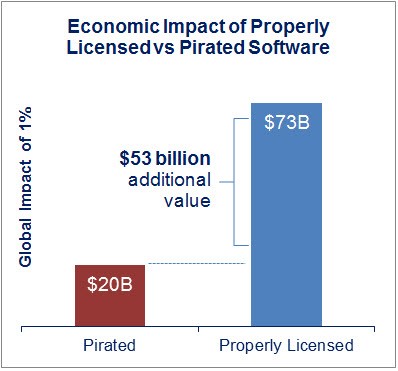 BSA has long highlighted the ways properly licensed software creates value for enterprises and economies. For example, a body of research shows that fully licensed software improves productivity and efficiency by reducing exposure to viruses and other security vulnerabilities — meaning fewer system malfunctions, downtime, and IT repair costs. It also comes with value-added services such as access to upgrades, patches, and manufacturer support services, including training and problem resolution.
BSA has long highlighted the ways properly licensed software creates value for enterprises and economies. For example, a body of research shows that fully licensed software improves productivity and efficiency by reducing exposure to viruses and other security vulnerabilities — meaning fewer system malfunctions, downtime, and IT repair costs. It also comes with value-added services such as access to upgrades, patches, and manufacturer support services, including training and problem resolution.
These benefits add up — helping firms to reduce costs and drive further investment. That, in turn, delivers more enterprise-level production and, ultimately, national economic growth.
Yet, for just as long, we have heard counter-arguments that pirating software is economically beneficial, because it gives users the productivity benefits of software without the overhead costs. (Never mind that piracy is against the law.)
But new research conducted for BSA by INSEAD, one of the world’s leading business schools, conspicuously undercuts the pro-piracy argument. It finds that properly licensed software adds an average of three times more value to national economies than pirated software. Moreover, the greatest returns on investment in legal software come in emerging markets where piracy rates are highest.
Competitive Advantage: The Economic Impact of Properly Licensed Software evaluates eight years’ worth of data across 95 countries. It finds that increasing use of properly licensed software by just 1 percent would add $73 billion to the global economy. A similar increase in pirated software would add $20 billion — meaning there is a $53 billion advantage associated with licensed software.
The study serves as new evidence that investments in properly licensed software pay huge dividends, and that governments should view curbing piracy as a growth opportunity. That requires putting in place strong laws and enforcement mechanisms to protect the intellectual property rights of innovators — and, importantly, it requires governments to lead by example by using only fully licensed software.
In a sluggish global economy, no country can afford to leave billions of dollars on the table by letting software piracy persist.
To download the study, go to: www.bsa.org/softwarevalue.


Economic benefits to the global economy are missing a huge set of numbers that are not considered in the article above.
The real cost/benefit trade-offs need to take into account the significant cost burdens borne by organizations globally in terms of expending overhead costs on chasing and verifying licensing conditions that are varying all the time.
Vendor license changes makes it hard, if not impossible for any organization (large/medium/small) to become and remain compliant.
Any organization claiming they are fully compliant is lying. They cannot possibly be based on what we keep seeing in real-life.
Constantly changing licensing rules by “shifting the goal posts by vendors” is crippling businesses with unwarranted and unnecessary costs (overhead) that would be equal to, or more than, the values being quoted as adding value to the global economy.
It’s no wonder some sites have opted for “buy once and install many times”.
Make the software licensing simpler and easier and the solution is a win-win all round but the BSA seems to have missed this in all its years of operation.
Here’s a challenge for the new president of the BSA.
Make the software vendors simplify licensing and keep the licensing changes to a minimum.
License management can be challenging. Software asset management (SAM) programs can help companies to minimize the risk (security and legal) and extract more value from existing software assets. BSA offers many free options, as well as our ISO-aligned SAM Advantage and Verafirm programs which are designed to give organizations access to information and tools necessary for license management.